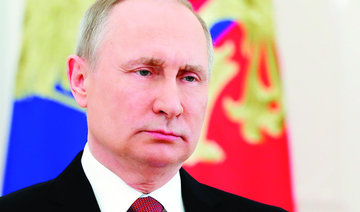ANKARA: Vladimir Putin, Russia’s president, was in Ankara on Tuesday for talks with Recep Tayyip Erdogan, his Turkish counterpart, over moving forward on Syria, as well as how to boost economic and energy ties.
The two leaders will hold a tripartite summit devoted to Syria with Hassan Rouhani, Iran’s president, on Wednesday. The three countries are sponsoring a series of peace efforts to end the conflict amid increasing confrontation with the West.
They were expected to discuss setting up a constitutional committee, humanitarian issues and developments in Syria’s northern Idlib region, which is under the control of rival rebel factions and jihadi groups, Reuters reported.
Turkey and Russia have put aside traditional rivalries to forge closer links. Putin and Erdogan have met several times in the past year and speak regularly on the phone. Ankara’s relations with Moscow collapsed in 2015 when Turkey shot down a Russian warplane, but have rallied since.
Putin’s visit to Turkey is his first trip abroad since he won a fourth presidential mandate in elections on March 18. His relations with the West have slumped since the March poisoning of Sergei Skripal, a former Russian double agent, and his daughter, in the UK.
EU powers supported Britain in condemning Russia and expelling diplomats following the attack. Turkey, however, has said that Ankara will not act against Moscow “based on an allegation.”
Akkuyu nuclear plant
Putin and Erdogan watched via video conferencing as work commenced at the first unit of the Akkuyu nuclear power plant — a $20 billion (SR75 billion), 4,800-megawatt plant in Turkey’s southern province of Mersin, which Turkey is about to start building with Russia.
The project is part of Erdogan’s “2023 vision,” marking 100 years since the founding of modern Turkey. It aims to reduce Turkey’s dependence on energy imports — the plant is expected to meet around 10 percent of Turkey’s electricity needs once it is up and running in around 2023.
Turkey is also negotiating the purchase of S-400 missile defense systems from Russia, a move that has been criticized by Ankara’s NATO allies.
Russia and Turkey are also building the TurkStream gas pipeline under the Black Sea that will allow Moscow to pump gas to Europe, avoiding Ukraine, increasing Turkey’s importance as a transit hub.


























